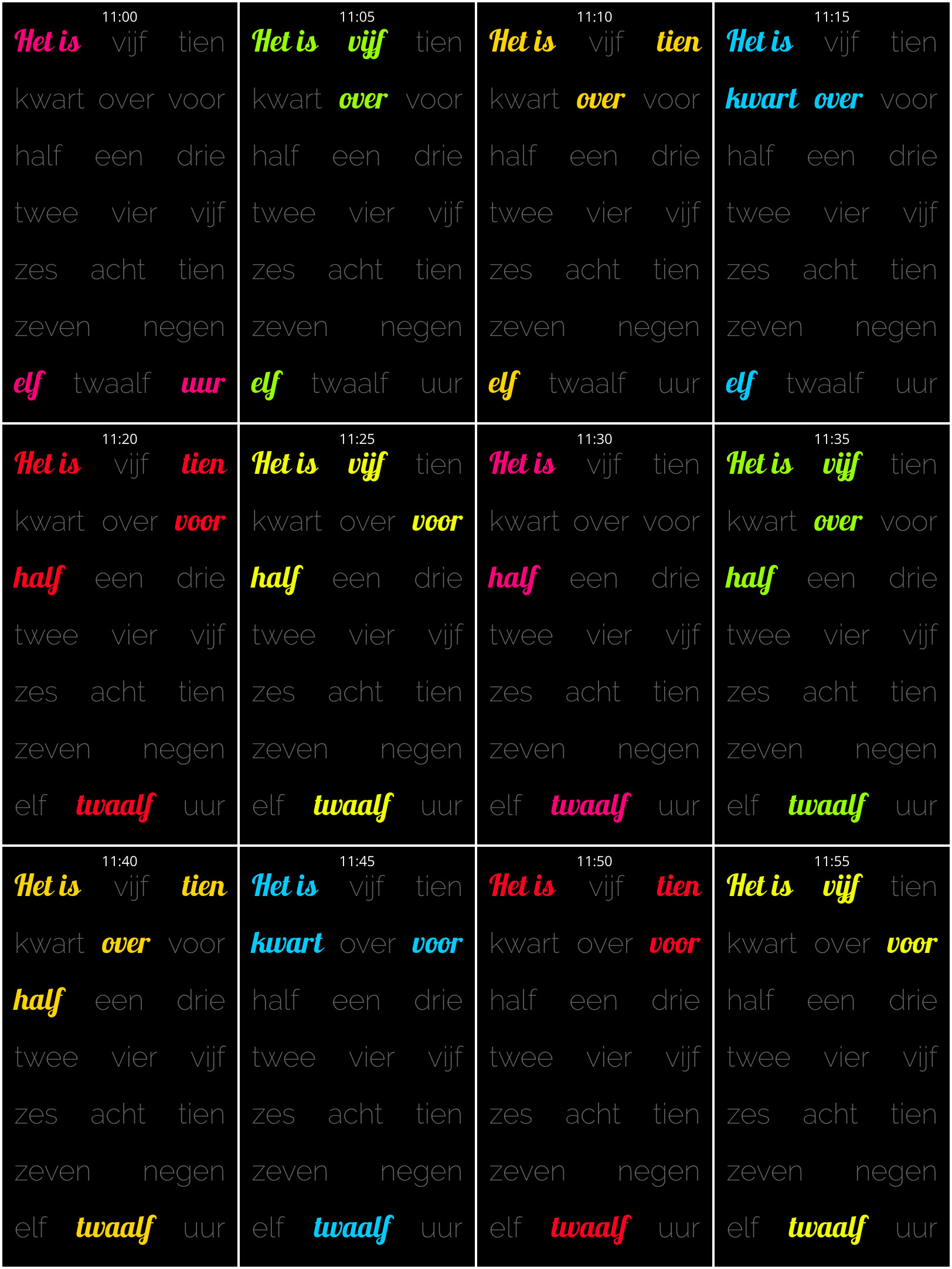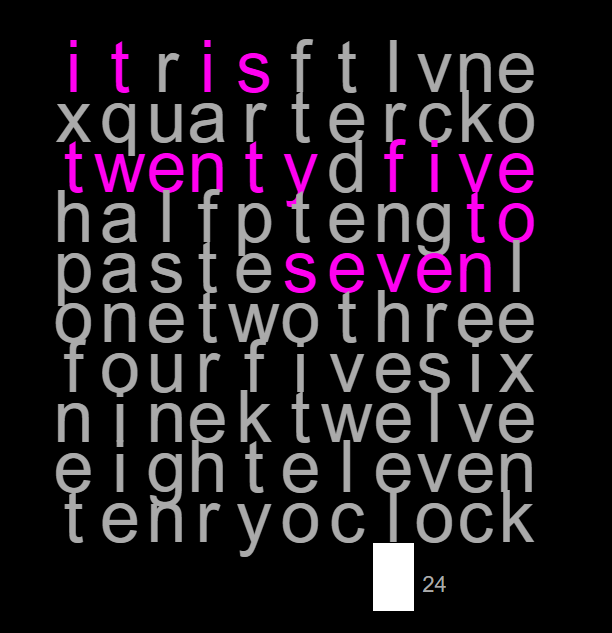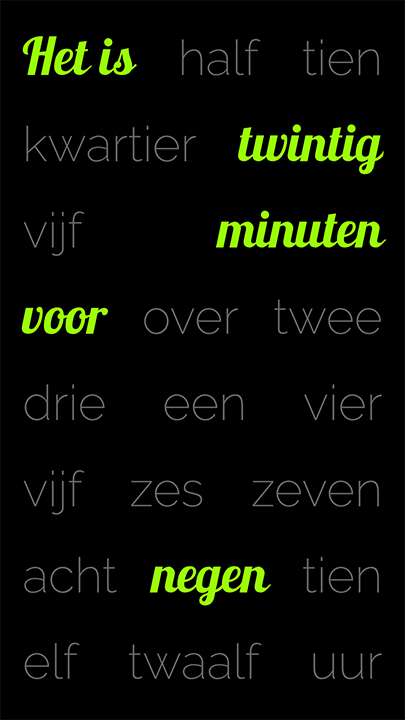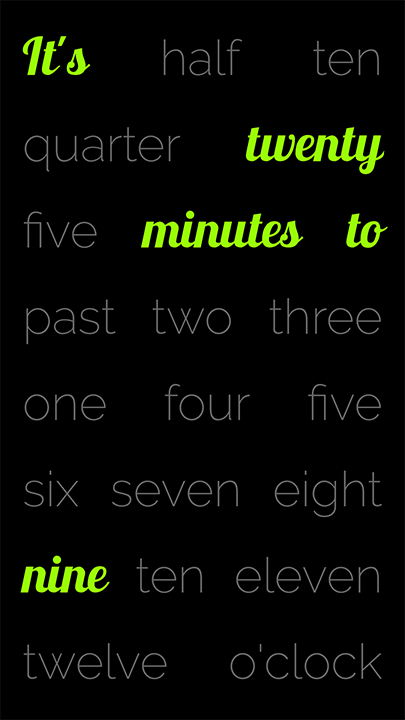Read the statement by Michael Teeuw here.
Help Translating Word Clock
-
Funny, I just started making a module like this myself yesterday because there was none. Looks very good so far.
12-hour based makes more sense. I solved it by adding two numbers below the clock, 12 and 24. When the hour is less or equal than 12, 12 is lit and if it’s greater than 12 lit up 24 (if that makes any sense).
I can show a screenshot of my module if you are interested.
-
@pjkoeleman This is wonderful! Thank you very much. I’ll work this in this evening and post a few screenshots.
-
@Ultimatum22 Heh! There was already an existing one – MMM-TextClock – before I started mine. It is very good, but not exactly what I was looking for, hence why I wrote my own. Interested to see how yours turns out.
Nice to have three to choose from!
-
@pjkoeleman I had a few minutes, so I threw this together real quick. How does it look to you?

-
@j-e-f-f
That is looking very very good!
I can only spot one minor issue. There is two times the Five (vijf) and two times the Ten (tien) in the image.Stupid of me these is nessesary for de hourly times, sorry
-
@pjkoeleman Heh! No worries. Thanks for verifying. Hopefully others can help with the other languages.
-
I didn’t found that other module, thanks for pointing it out.
This is what I got so far, still a work in progress. The white square is supposed to be the rest minutes.

-
I join my predecessor @pjkoeleman
German Translation:
{ "ITIS": "Es ist", "HALF": "halb", "QUARTER": "viertel", "MINUTES": "Minuten", "TO": "vor", "PAST": "nach", "ONE": "eins", "TWO": "zwei", "THREE": "drei", "FOUR": "vier", "FIVE": "fünf", "SIX": "sechs", "SEVEN": "sieben", "EIGHT": "acht", "NINE": "neun ", "TEN": "zehn", "ELEVEN": "elf", "TWELVE": "zwölf", "TWENTY": "zwanzig", "OCLOCK": "Uhr", "THIRTEEN": "dreizehn", "FORTEEN": "vierzehn", "FIFTEEN": "fünfzehn", "SIXTEEN": "sechzehn", "SEVENTEEN": "siebenzehn", "EIGHTEEN": "achtzehn", "NINETEEN": "neunzehn", "THIRTY": "dreißig", "FORTY": "dierzig", "FIFTY": "fünfzig", "OH": "0?", "HUNDRED": "hundert", "ZERO": "null" }It’s one o’clock -> Es ist ein Uhr
It’s five minutes past one -> Es ist fünf nach eins (more common) / Es ist fünf nach ein Uhr
It’s ten minutes past one -> Es ist zehn nach eins (more common) / … ein Uhr
It’s quarter past one -> regional different: “Es ist viertel zwei” - “Es ist viertel nach eins / … ein Uhr”
It’s twenty minutes past one -> Es ist zwanzig Minuten nach eins / … ein Uhr
It’s twenty-five minutes past one -> Es ist fünfundzwanzig Minuten nach eins / Es ist fünf vor halb zwei (more common)
It’s half past one -> Es ist halb zwei (rounded up to next full hour)
It’s twenty-five minutes to two -> Es ist fünfunfzwanzig Minuten vor zwei / Es ist fünf nach halb 2 zwei (more common)
It’s twenty minutes to two -> Es ist zwanzig Minuten vor zwei / Es ist zehn nach halb 2 (more common)
it’s quarter to two -> regional differenz: “Es ist dreiviertel zwei” - “Es ist viertel vor zwei Uhr”
It’s ten minutes to two -> Es ist zehn Minuten vor zwei Uhr
It’s five minutes to two -> Es ist 5 Minuten vor zwei Uhr
It’s eleven o’clock (both 11:00 and 23:00) -> Es ist elf Uhr // Es ist dreiundzwanzig Uhr
It’s twelve o’clock (both 00:00 and 12:00) -> Es ist null Uhr // Es ist zwölf Uhr
It’s one o’clock (both 01:00 and 13:00) -> Es ist ein Uhr / Es ist dreizehn Uhr
Normaly we leave the “minutes” and “o’clock” away, like saying time in Dutch.
If you need more details, please ask. -
@clubbi Thank you! I’ll be adding this tonight along with a French translation.
One question: I notice a small difference in the first example:
It’s five minutes past one -> Es ist fünf nach eins (more common) / Es ist fünf nach ein Uhr
in the second example, there is no “s” at the end on “ein”. Does this mean when it’s on the hour (e.g.: 1:00) one would say “Es ist ein Uhr”, but when the word “Uhr” is not used, there is an “s”? (e.g.: “Es ist fünf nach eins”). Is the case for any other hours? I noticed it wasn’t for “Es ist fünfunfzwanzig Minuten vor zwei”
Also, is “Uhr” always capitalized? e.g.: would “Es ist elf uhr” be incorrect?
Cheers!
-
@j.e.f.f In German the additional “s” is only relevant for the number 1. So without “Uhr” the “s” is required and with a sentence with “Uhr” the “s” must be omitted.
“Uhr” is always capitalized. So your example “Es ist elf uhr” is incorrect.


